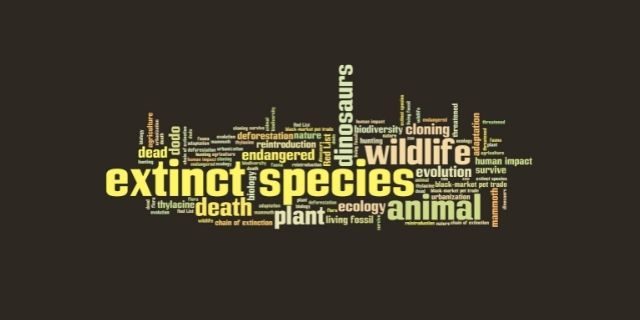20
Sep
We Must End the Sixth Extinction

(Beyond Pesticides, September 20, 2021) Scientists warn that humanity is causing the sixth mass extinction in the planet’s history. A series of reports from the United Nations Environment Program (UNEP) highlights how human activities threaten the healthy functioning of ecosystems that produce food and water, as well as one million species now at risk of extinction. The UNEP report, Food System Impacts on Biodiversity Loss, identifies the global food system as the primary driver of biodiversity loss. The report points to the conversion of natural ecosystems to crop production and pasture, with concomitant use of toxic chemicals, monoculture, and production of greenhouse gases.
In view of the many steps that have been identified to stop both biodiversity loss and global climate change, it is beyond disappointing to see our “Environmental Protection Agency” continuing to allow use of chemicals that it recognizes will contribute to the problems.
The United Nations Convention on Biological Diversity (CBD) is the international legal instrument for “the conservation of biological diversity, the sustainable use of its components and the fair and equitable sharing of the benefits arising out of the utilization of genetic resources.” It has been ratified by 196 nations—all the members of the United Nations except the United States and the Vatican. The CBD includes 21 action targets to be achieved by 2030, including reducing pesticide use by two-thirds, eliminating plastic waste, and “fully integrating biodiversity values into policies, regulations, planning, development processes, poverty reduction strategies, accounts, and assessments of environmental impacts at all levels of government and across all sectors of the economy, ensuring that all activities and financial flows are aligned with biodiversity values.”
Letter to Congressional Representative and Senators
Scientists warn that humanity is causing the sixth mass extinction in the planet’s history. A series of reports from the United Nations Environment Program (UNEP) highlights how human activities threaten the healthy functioning of ecosystems that produce food and water, as well as one million species now at risk of extinction. The UNEP report Food System Impacts on Biodiversity Loss identifies the global food system as the primary driver of biodiversity loss. The report points to the conversion of natural ecosystems to crop production and pasture, with concomitant use of toxic chemicals, monoculture, and production of greenhouse gases.
In view of the many steps that have been identified to stop both biodiversity loss and global climate change, it is beyond disappointing to see our “Environmental Protection Agency” continuing to allow use of chemicals that it recognizes will contribute to the problems.
The United Nations Convention on Biological Diversity (CBD) is the international legal instrument for “the conservation of biological diversity, the sustainable use of its components and the fair and equitable sharing of the benefits arising out of the utilization of genetic resources.” It has been ratified by 196 nations—all the members of the United Nations except the United States and the Vatican. The CBD includes 21 action targets to be achieved by 2030, including reducing pesticide use by two-thirds, eliminating plastic waste, and “fully integrating biodiversity values into policies, regulations, planning, development processes, poverty reduction strategies, accounts, and assessments of environmental impacts at all levels of government and across all sectors of the economy, ensuring that all activities and financial flows are aligned with biodiversity values.”
Please ensure that the United States becomes a party to the CBD.
Thank you.
Letter to EPA Administrator Regan
Scientists warn that humanity is causing the sixth mass extinction in the planet’s history. A series of reports from the United Nations Environment Program highlights how human activities threaten the healthy functioning of ecosystems that produce food and water, as well as one million species now at risk of extinction. The UNEP report Food System Impacts on Biodiversity Loss identifies the global food system as the primary driver of biodiversity loss. The report points to the conversion of natural ecosystems to crop production and pasture, with concomitant use of toxic chemicals, monoculture, and production of greenhouse gases.
In view of the many steps that have been identified to stop both biodiversity loss and global climate change, it is beyond disappointing to see our “Environmental Protection Agency” continuing to allow use of chemicals that it recognizes will contribute to the problems.
The United Nations Convention on Biological Diversity (CBD) is the international legal instrument for “the conservation of biological diversity, the sustainable use of its components and the fair and equitable sharing of the benefits arising out of the utilization of genetic resources.” It has been ratified by 196 nations—all the members of the United Nations except the United States and the Vatican. The CBD includes 21 action targets to be achieved by 2030, including reducing pesticide use by two-thirds, eliminating plastic waste, and “fully integrating biodiversity values into policies, regulations, planning, development processes, poverty reduction strategies, accounts, and assessments of environmental impacts at all levels of government and across all sectors of the economy, ensuring that all activities and financial flows are aligned with biodiversity values.”
Until Congress acts to make the United States a party to the CBD, EPA should, as an agency, take actions that are consistent with the action targets of the CBD. In particular, registrations of all pesticides that threaten pollinators, threatened and endangered species, or the functioning of ecosystems should be cancelled as soon as possible.
Thank you.










